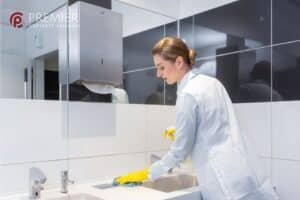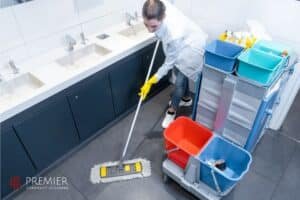Imagine sinking your toes into a plush carpet, feeling its softness beneath your feet. Now picture that same carpet looking vibrant and fresh, free from stains or dirt. It’s possible, and it’s simpler than you might think. You don’t need to hire expensive professionals or rent complicated machines. You can clean your carpet at home […]
How to Start a Commercial Cleaning Business: Ultimate Guide
Starting a commercial cleaning business can be a smart move. It offers a steady demand and low startup costs.
Many entrepreneurs find this industry appealing. Cleaning businesses cater to various sectors like offices, schools, and hospitals. As the need for clean spaces grows, so does the opportunity for new cleaning ventures. But where do you begin? This blog will guide you through the essential steps.
From understanding market needs to setting up your business, we cover it all. Whether you aim to be a solo cleaner or manage a team, these insights will help. Ready to dive in and build a successful cleaning business? Let’s get started!

Business Concept
Starting a commercial cleaning business can be a profitable venture. The key is to develop a solid business concept. This involves understanding the services you will offer and identifying your target market. A clear business concept helps set the foundation for your company’s success.
Identify Services
First, decide which cleaning services you will provide. Commercial cleaning can include various tasks, so it's important to be specific. Here are some common services offered:
- Office Cleaning
- Restroom Sanitation
- Carpet Cleaning
- Window Washing
- Hard Floor Care
- Trash Removal
Consider the following table to outline your services more clearly:
| Service | Description |
| Office Cleaning | Dusting, vacuuming, and general upkeep of office spaces. |
| Restroom Sanitation | Cleaning and disinfecting restrooms, restocking supplies. |
| Carpet Cleaning | Deep cleaning carpets to remove dirt and stains. |
| Window Washing | Cleaning interior and exterior windows. |
| Hard Floor Care | Cleaning, waxing, and polishing hard flooring. |
| Trash Removal | Emptying trash bins and recycling containers. |
Offering a range of services can help attract different clients. Be sure to list all your services in your marketing materials. This helps potential clients know what to expect.
To Get The Best Commercial Cleaning Service - Click Here
Target Market
Identifying your target market is crucial. It allows you to focus your marketing efforts and resources. Consider the following potential clients:
- Small Businesses
- Large Corporations
- Healthcare Facilities
- Schools and Universities
- Retail Stores
- Government Buildings
Each type of client may have different needs. For example, healthcare facilities often require more stringent cleaning standards. Schools may need cleaning after hours. Understanding these needs helps tailor your services.
Use demographic information to target your market:
| Client Type | Specific Needs |
| Small Businesses | Basic office cleaning, trash removal. |
| Large Corporations | Comprehensive cleaning, including carpet and window services. |
| Healthcare Facilities | High sanitation standards, regular disinfecting. |
| Schools and Universities | Cleaning during off-hours, large area coverage. |
| Retail Stores | Daily floor cleaning, trash removal. |
| Government Buildings | Security clearance, detailed cleaning. |
Knowing your target market helps in creating effective marketing strategies. It ensures that your services meet the specific needs of your clients. This will lead to higher customer satisfaction and business growth.
Market Research
Starting a commercial cleaning business can be a lucrative venture. But success relies heavily on thorough market research. Understanding your competition and evaluating demand are essential steps. These will help you position your business effectively and cater to customer needs.
Analyze Competition
Before diving into the market, it's crucial to know who you're up against. Analyzing competition will give you insights into their strengths and weaknesses. This allows you to identify opportunities to stand out. Here's how you can do it:
- Identify Competitors: List down all commercial cleaning businesses in your area. Use online directories and local business listings.
- Study Their Services: What services do they offer? Are there any gaps you can fill? Understanding their service offerings will help you define your own.
- Pricing Strategy: Look at their pricing. Are they charging premium rates or offering discounts? This will help you set competitive prices.
- Customer Reviews: Read online reviews. What do customers like or dislike about their services? This feedback is valuable for improving your own services.
Below is a simple table to help you organize your competitor analysis:
| Competitor Name | Services Offered | Pricing Strategy | Customer Feedback |
| CleanPro Services | Office Cleaning, Carpet Cleaning | Premium Rates | Highly rated, but expensive |
| EcoClean Solutions | Green Cleaning, Window Washing | Moderate Rates | Positive feedback on eco-friendly methods |
This structured approach ensures you gather all necessary information. It helps in making informed decisions.

Evaluate Demand
Assessing the demand for commercial cleaning services in your area is the next step. This will help you understand if there's a market for your business. Here are some methods to evaluate demand:
- Survey Potential Clients: Conduct surveys with businesses in your target area. Ask about their current cleaning services and needs.
- Analyze Market Trends: Look for reports and studies on the commercial cleaning industry. Trends can give you an idea of growing or declining demand.
- Check Online Search Trends: Tools like Google Trends can show you how often people search for cleaning services. This indicates interest levels over time.
- Local Business Growth: Examine new businesses opening in your area. More businesses mean more potential clients for your services.
Here's a quick example of how to organize your findings:
| Method | Findings |
| Client Surveys | 70% of businesses want more reliable cleaning services |
| Market Trends | Increasing demand for eco-friendly cleaning solutions |
| Search Trends | High search volume for "commercial cleaning services" in the area |
| Local Growth | 10 new office buildings under construction |
Evaluating demand helps you tailor your services to meet market needs. It also ensures that you are entering a market with enough potential clients.
Business Plan
Starting a commercial cleaning business requires a well-thought-out business plan. This document will guide your efforts and help secure funding. It covers several key areas, including financial projections and a marketing strategy. Each section must be detailed and realistic to ensure your business has a solid foundation.
Financial Projections
Financial projections are essential for understanding your business's potential profitability. These projections show expected revenue, expenses, and profit margins. Start by estimating your initial costs and monthly expenses.
Here are some key elements to include in your financial projections:
- Startup Costs: This includes equipment, supplies, and initial marketing expenses.
- Monthly Expenses: These are ongoing costs like rent, utilities, salaries, and cleaning supplies.
- Revenue Projections: Estimate the income from your cleaning contracts.
- Profit Margins: Calculate the difference between your revenue and expenses.
Below is an example table for a basic financial projection:
| Item | Cost |
| Equipment | $5,000 |
| Supplies | $1,000 |
| Initial Marketing | $2,000 |
| Monthly Rent | $1,500 |
| Utilities | $300 |
| Salaries | $4,000 |
Review these projections regularly to ensure your business remains on track. Adjust your estimates based on actual performance to stay realistic.
Marketing Strategy
A strong marketing strategy helps you attract clients and grow your business. Start by identifying your target market. Determine the types of businesses that need your cleaning services.
Consider these marketing tactics:
- Online Presence: Create a professional website. Use social media to reach potential clients.
- Networking: Attend local business events. Build relationships with potential clients.
- Referrals: Encourage satisfied clients to refer your services to others.
- Advertising: Use local newspapers, online ads, and community bulletin boards.
Below is an example table for a basic marketing strategy:
| Tactic | Cost |
| Website Development | $1,000 |
| Social Media Ads | $500/month |
| Networking Events | $200/event |
| Print Advertising | $300/month |
Track the effectiveness of your marketing efforts. Use analytics tools to measure website traffic and conversion rates. Adjust your strategy based on what works best for your business.
Legal Requirements
Starting a commercial cleaning business involves more than just having the right equipment and a reliable team. Understanding the legal requirements is crucial to ensure your business operates smoothly and avoids legal complications. This section will guide you through the essential legal aspects, focusing on licensing and insurance needs.
Licensing
Before you begin offering cleaning services, you must obtain the necessary licenses. These licenses vary depending on your location and the scale of your business. Here are some key points to consider:
- Business License: Most local governments require a business license. This legal document allows you to operate within a specific area.
- Employer Identification Number (EIN): If you plan to hire employees, you need an EIN from the IRS. This number is used for tax purposes.
- Special Permits: Some states and cities require special permits for businesses that handle cleaning chemicals. Check with your local government to see if this applies to you.
- Health and Safety Certifications: In certain areas, businesses must comply with health and safety regulations. Obtaining these certifications ensures your business meets local standards.
Failing to secure the proper licenses can result in fines and legal action. Keep track of renewal dates and maintain your licenses in good standing.
Insurance Needs
Insurance is vital for protecting your business, employees, and clients. Several types of insurance are essential for a commercial cleaning business:
- General Liability Insurance: This covers property damage and bodily injuries caused by your business operations. For instance, if an employee accidentally damages a client's property, this insurance will cover the costs.
- Workers' Compensation Insurance: If you have employees, this insurance is often required by law. It covers medical expenses and lost wages for employees injured on the job.
- Bonding Insurance: This provides financial protection if an employee steals from a client. Many clients prefer to work with bonded companies.
- Commercial Auto Insurance: If your business uses vehicles, this insurance covers accidents and damages involving your company vehicles.
Here's a quick comparison of the different types of insurance:
| Type of Insurance | Coverage |
| General Liability | Property damage, bodily injury |
| Workers' Compensation | Employee injuries |
| Bonding | Theft by employees |
| Commercial Auto | Vehicle accidents |
Having the right insurance protects your business from unexpected expenses and builds trust with your clients. Regularly review your policies to ensure they meet your business needs.
To Get The Best Commercial Cleaning Service - Click Here
Funding Options
Starting a commercial cleaning business is an exciting venture. But funding your new business is the first hurdle. There are different funding options available to get your business off the ground.
Personal Savings
Using personal savings is a common way to fund a new business. It's straightforward and doesn't involve debt. You have full control over your funds. Here are some points to consider:
- No Debt: You don’t owe money to anyone.
- Full Control: You make all decisions without outside interference.
- Personal Risk: You risk your own money.
If you use your savings, create a budget. Know how much you need. This will help you allocate funds wisely. Here is a simple budget table for a commercial cleaning business:
| Item | Cost |
| Cleaning Supplies | $500 |
| Equipment | $2,000 |
| Marketing | $1,000 |
| Insurance | $600 |
| Miscellaneous | $400 |
Using personal savings can also boost your confidence. You believe in your business enough to invest your own money. This can be a strong motivator to succeed.

Loans And Grants
Another option is getting loans or grants. These can provide the funds you need without using your own savings. Here are some types of loans and grants:
- Bank Loans: Traditional loans from banks. They require good credit scores and collateral.
- Small Business Administration (SBA) Loans: Government-backed loans with favorable terms.
- Grants: Non-repayable funds from government or private organizations. They often have strict eligibility criteria.
Before applying for loans or grants, prepare a business plan. It should include:
- Business overview
- Market analysis
- Financial projections
- Funding requirements
Having a solid business plan can increase your chances of getting approved. Here is a simple comparison table for loans and grants:
| Funding Option | Pros | Cons |
| Bank Loans | Large amounts, structured repayment | Interest rates, credit requirements |
| SBA Loans | Favorable terms, government support | Long approval process |
| Grants | No repayment, free money | Competitive, strict criteria |
Loans and grants can provide the necessary funds to start your business. They can help cover startup costs and initial expenses. Choose the option that best fits your needs and situation.
Equipment And Supplies
Starting a commercial cleaning business requires more than just a desire to clean. You need the right equipment and supplies to ensure efficiency and quality service. Investing in the right tools and building strong supplier relationships are crucial steps in setting up your business for success.
Essential Tools
Having the right tools is critical for the success of your commercial cleaning business. These tools help you perform your tasks efficiently and meet clients' expectations.
Here is a list of essential tools you will need:
- Vacuum Cleaners: Choose industrial-grade vacuums for heavy-duty cleaning. These vacuums are powerful and durable.
- Mops and Buckets: Microfiber mops and sturdy buckets are important for thorough floor cleaning.
- Cleaning Cloths: Use microfiber cloths for dusting and wiping surfaces. They are effective and reusable.
- Scrub Brushes: Different sizes and types for various surfaces and stains.
- Floor Buffers: Essential for maintaining large floor areas, making them shine.
- Window Cleaning Tools: Squeegees, extension poles, and glass cleaners for spotless windows.
- Protective Gear: Gloves, masks, and goggles to ensure safety while handling chemicals.
Investing in high-quality tools will save you time and money in the long run. These tools last longer and perform better, ensuring customer satisfaction.
Supplier Relationships
Building strong relationships with suppliers is essential for the smooth operation of your commercial cleaning business. Reliable suppliers ensure that you have a steady supply of quality products at competitive prices.
Here are some tips for establishing good supplier relationships:
- Research: Identify reputable suppliers who offer the products you need.
- Negotiate: Discuss terms and prices to get the best deals. Bulk purchasing can often lead to discounts.
- Consistency: Order regularly to build a reliable relationship. Consistent business can lead to better deals and priority service.
- Communication: Maintain open lines of communication. Clearly express your needs and expectations.
- Feedback: Provide feedback on products and services. This helps suppliers improve and meet your needs better.
Having dependable suppliers allows you to focus on your core business activities. This ensures that you always have the right supplies when you need them, avoiding any disruptions in service.
Marketing Tactics
Starting a commercial cleaning business involves more than just offering great services. Effective marketing tactics are essential for attracting clients and growing your business. Here, we will focus on two key marketing strategies: establishing a strong online presence and leveraging networking opportunities.
Online Presence
Having a robust online presence is crucial in today’s digital age. This is how potential clients find and learn about your services. Here are some steps to enhance your online visibility:
- Create a Professional Website: Your website should provide clear information about your services, pricing, and contact details. Ensure it is mobile-friendly and fast-loading.
- Optimize for SEO: Use relevant keywords such as "commercial cleaning services" and "office cleaning" throughout your website content. This helps in ranking higher on search engines.
- Leverage Social Media: Platforms like Facebook, LinkedIn, and Instagram can help you reach a broader audience. Regularly post updates, cleaning tips, and client testimonials.
- Google My Business: Register your business on Google My Business. This helps in appearing in local search results and Google Maps.
- Online Reviews: Encourage satisfied clients to leave positive reviews on Google and Yelp. Positive reviews build trust and attract new clients.
Consider the following table for a quick overview:
| Online Presence Aspect | Key Actions |
| Website | Professional design, mobile-friendly, clear information |
| SEO | Use relevant keywords, optimize content |
| Social Media | Regular posts, engage with followers |
| Google My Business | Register, keep information updated |
| Online Reviews | Encourage reviews, respond to feedback |
Networking
Networking is an effective way to build relationships and find new clients. Here are some tips for successful networking:
- Join Local Business Groups: Participate in local business associations and chambers of commerce. These platforms allow you to meet other business owners and potential clients.
- Attend Industry Events: Industry trade shows and conferences are great places to connect with other professionals and learn about new trends.
- Business Cards: Always carry business cards. They are a quick way to share your contact information with new connections.
- Referral Programs: Create a referral program where existing clients can refer new clients to you. Offer discounts or other incentives for referrals.
- Collaborate with Other Businesses: Partner with related businesses like office supply companies. This can lead to mutually beneficial referrals.
Here's a summary in a table format:
| Networking Tactic | Action Items |
| Local Business Groups | Join, participate in events |
| Industry Events | Attend, network with peers |
| Business Cards | Carry, distribute at events |
| Referral Programs | Create, offer incentives |
| Collaborations | Partner with related businesses |
Hiring Staff
Starting a commercial cleaning business can be a rewarding venture. One of the most crucial aspects of this journey is hiring the right staff. Your team will be the face of your business. They will interact with clients and ensure high standards of cleanliness. Thus, it is essential to have a clear strategy for recruiting and training your staff.
Recruitment Process
Finding the right employees for your commercial cleaning business requires a detailed recruitment process. Start by defining the roles you need to fill. This may include cleaners, supervisors, and administrative staff.
To attract suitable candidates, you can:
- Post job ads on online job boards
- Contact local employment agencies
- Use social media platforms
- Ask for referrals from current employees
When reviewing applications, look for candidates with:
- Prior cleaning experience
- Good communication skills
- Attention to detail
- Positive references
After narrowing down your choices, conduct interviews to assess their suitability. During the interview, ask about their previous experience, work ethic, and availability. Consider using a scoring system to evaluate each candidate's responses objectively.
Here is a simple table to help you keep track of the recruitment process:
| Step | Description |
| Job Posting | Advertise the job on various platforms |
| Application Review | Screen resumes and shortlist candidates |
| Interviews | Conduct interviews to assess suitability |
| Hiring Decision | Select the best candidates for the roles |
Training Programs
Once you have hired your team, the next step is to train them effectively. A well-structured training program ensures your staff knows the standards and procedures of your business.
Consider the following components for your training programs:
- Orientation: Introduce new hires to your company, its values, and policies.
- Safety Training: Teach them about safety protocols and the proper use of cleaning equipment and chemicals.
- Cleaning Techniques: Demonstrate the correct methods for different cleaning tasks such as dusting, vacuuming, and sanitizing.
- Customer Service: Train them on how to interact professionally with clients.
Use a mix of training methods to enhance learning:
- Classroom sessions for theoretical knowledge
- Hands-on training for practical skills
- Videos and manuals for reference
- Regular assessments to track progress
Implementing a buddy system can also be beneficial. Pair new employees with experienced staff to provide on-the-job training and support.
Here's an example of a training schedule:
| Day | Activity |
| Day 1 | Orientation and Safety Training |
| Day 2 | Cleaning Techniques Workshop |
| Day 3 | Customer Service Training |
| Day 4 | Hands-on Practice with Buddy |
| Day 5 | Assessment and Feedback |
Providing ongoing training and development opportunities will help your staff stay updated with industry standards and improve their skills continuously.
To Get The Best Commercial Cleaning Service - Click Here
Customer Retention
Starting a commercial cleaning business is a great way to enter a stable and necessary industry. One of the key factors to ensure your success is customer retention. Keeping your clients happy and loyal will not only provide a steady income but also reduce the need for constant marketing to attract new customers. Two effective strategies for customer retention are feedback mechanisms and loyalty programs.
Feedback Mechanisms
Listening to your customers is crucial. Feedback mechanisms help you understand their needs and expectations. This allows you to make improvements and show clients that you value their opinions.
Here are some effective feedback mechanisms you can implement:
- Surveys: Send regular surveys to your clients. Ask specific questions about your services.
- Suggestion Boxes: Place suggestion boxes at client locations. This encourages them to share their thoughts anonymously.
- Follow-Up Calls: After completing a job, make follow-up calls. Ask how satisfied they are with the service.
- Online Reviews: Monitor online reviews on platforms like Google and Yelp. Respond to both positive and negative reviews.
Creating a table for tracking feedback can be very helpful:
| Client Name | Feedback Method | Comments | Action Taken |
| Client A | Survey | Excellent service, but room for improvement in punctuality | Adjusted schedule to ensure punctuality |
| Client B | Follow-Up Call | Very satisfied with the cleaning quality | Sent a thank-you note |
Loyalty Programs
Loyalty programs are a great way to keep your clients coming back. They offer incentives for continued business and make clients feel appreciated.
Consider these ideas for your loyalty program:
- Discounts: Offer discounts for long-term contracts. This encourages clients to commit for extended periods.
- Referral Bonuses: Provide bonuses for clients who refer new customers. This can be in the form of discounts or free services.
- Points System: Create a points system where clients earn points for each service. Points can be redeemed for discounts or free services.
- Exclusive Offers: Give loyal clients access to special offers and services. This can include priority booking or added service features.
Here's an example of how a points system might look:
| Service | Points Earned |
| Standard Cleaning | 10 |
| Deep Cleaning | 20 |
| Carpet Cleaning | 15 |
These programs help in building a long-term relationship with your clients. It also makes them feel valued and appreciated.

Frequently Asked Questions
What Licenses Are Needed For A Cleaning Business?
You need a business license and sometimes a special cleaning license. Check local regulations.
How Much Does It Cost To Start A Cleaning Business?
Starting costs vary. Typically between $2,000 to $10,000. Includes supplies, insurance, and marketing.
What Equipment Is Necessary For A Commercial Cleaning Business?
Basic equipment includes mops, vacuum cleaners, cleaning solutions, and safety gear. Quality tools improve efficiency.
How Can I Find Clients For My Cleaning Business?
Market through local ads, social media, and word of mouth. Networking and quality service help too.
To Get The Best Commercial Cleaning Service - Click Here
Conclusion
Starting a commercial cleaning business offers great opportunities. Focus on providing quality service. Build strong relationships with clients. Keep improving your skills and knowledge. Maintain a positive attitude. Stay organized and manage your time well. Success comes with dedication and hard work.
Be patient and persistent. Your efforts will pay off. Use these tips to grow your business. You can achieve your goals with determination. Happy cleaning!

Catalin Fatul is the founder and expert behind Premier Contract Cleaning, dedicated to providing top-notch cleaning solutions and tips. With a passion for cleanliness and a commitment to quality, Catalin brings years of experience in the cleaning industry to help readers maintain pristine spaces. Whether it's offering the latest cleaning hacks or recommending the best products, Catalin's mission is to make cleaning efficient, effective, and enjoyable.
Imagine this: you’re hosting a cozy gathering at your home. Everything's perfect until someone accidentally spills wine on your beautiful carpet. Panic sets in, but it doesn't have to. You can transform this daunting task into a simple, stress-free process. This guide will walk you through the easiest and most effective ways to clean stains […]
Do you ever look at your carpet and wonder how it got so dirty? Spills, muddy shoes, and pet accidents can quickly turn your plush floor covering into a grimy mess. You’re not alone if you feel overwhelmed by the thought of deep cleaning it. But imagine walking into a room with a carpet that […]
Wool carpets are a luxurious addition to any home, offering warmth, elegance, and durability. But when it comes to cleaning, they can pose quite the challenge. You might feel a pang of anxiety at the thought of damaging your beautiful carpet with the wrong cleaning method. You're not alone. Many homeowners share this concern, yet […]


